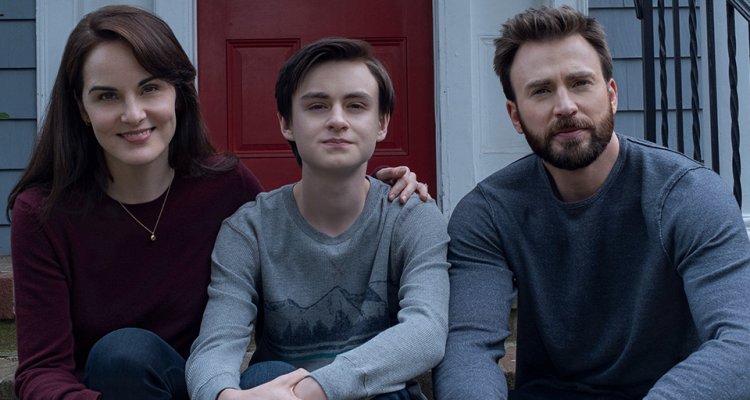“Defending Jacob,” Mark Bomback’s miniseries adaptation of the 2012 William Landay novel, is about parents’ dreams for their kids, but it’s also about the pictures parents paint for themselves of their kids. Mothers and fathers alike draw in their minds idealized portraits of not only who their children are or who they’re going to be, but who they were. So, what happens when your child is accused of murder and is perceived as a monster by the general public? That’s the question answered by Apple TV+‘s compulsively watchable drama that suffers from glaring, stylistic weaknesses.
The show starts off with a one-two punch of horror. In quiet, well-to-do Newton, Massachusetts, a teenager is brutally murdered and his classmate, Jacob (Jaeden Martell), becomes the prime suspect. The second punch is felt by the classmate’s parents, Andy and Laurie Barber (Chris Evans and Michelle Dockery). The father is an assistant district attorney, while the mother is an educator—along with their son, they’re the picture of the perfect American family.
From the outside, Jacob looks and acts like any other teenage boy. He keeps to himself. Every kid his age has secrets, and he hides his like coins flipped into a public fountain—they’re right in plain sight but out of moral reach because only the most unscrupulous people steal pennies and nickels out of municipal ornaments. Andy and Laurie rely on Jacob to open up to them in his own time and without their prodding, which doesn’t happen quickly or easily. But that’s fine. Teens do as teens do. What’s not fine is the array of unsettling discoveries they make upon the death of his fellow student—a rather serious looking knife stowed away in his nightstand, a serious lack of any substantial friendships, an overzealous enjoyment of violent video games, and the fact that he walks to school via the same park where the murdered boy was found.
Everything is circumstantial, but circumstantial is enough to convict him in the court of public opinion. Is it enough to convict him in actual court? Is there any real chance that Mamma Barber’s little boy is a sociopath capable of taking a life? “Defending Jacob” lets these questions press down on Evans and Dockery, the series’ emotional centers, but the desaturated palette over-clarifies their uncertainty. Director Morten Tyldum coats his visuals in pale shades of grey as if the particulars of the Barbers’ plight require aesthetic representation.
But “Defending Jacob” is built on a foundation of ambiguity. The show leverages America’s recent history of public bloodshed—predominantly carried out by young, and typically white, men—against its viewers, subtly leading them to cast a verdict before the cases for and against Jacob are made. This isn’t Lynne Ramsay’s “We Need to Talk About Kevin,” where the title character’s guilt is never in doubt. Here, doubt provides oxygen. The story is filtered almost entirely through the eyes of Andy and Laurie, with a little room for the perspective to swap to Jacob’s. Neither parent can bring themselves to accept the possibility that the accusation might be true, because accepting the possibility means Jacob killed either in cold blood or in retaliation for being bullied past his limits. At best, that makes him vindictive. At worst, it makes him a monster.
In a key scene in the series’ third episode, “Poker Faces,” the couple visits Dr. Vogel (Poorna Jagannathan), a biopsychologist testing Jacob for the “murder gene,” and clash repeatedly with one another over their recollections of his boyhood. Andy only remembers the best of Jacob and downplays Laurie’s memories of hard times, the hours of colic screaming and the physical altercations with other kids. Moms, the show tells its audience, know their kids, the opposite end of that being that dads don’t. Frankly, Jacob may not know Jacob very well either. With Andy and Laurie both insisting on who they think he is, how could he?
But all of the show’s shrewd reflections suffocate in Tyldum’s heavy-handed grasp and stumble over Bomback’s writing. When Andy and Laurie talk about the slain teen, they might as well be talking about a tree caving in a neighbor’s roof or a friend’s unexpected job loss—they don’t speak the language of second-hand trauma. It’s clinical, as is so much of the show’s dialogue, where conversations are constructed so that the silent part is always said out loud. There’s no legwork required to intuit motivations or emotions. It’s a mercy that “Defending Jacob” gives lines to actors of Evans’ and Dockery’s caliber; they each lend desperately needed naturalism to their characters’ otherwise clunky dialogue.
Watching Evans reconsider his persona as Captain America, the spitting image of truth, justice, and the American way, in a story that’s so distinctly American, is genuinely fascinating. Evans funnels his brawn into Andy’s self-assuredness, gained over years of excellence at trial; watch for a tremor in his brow when his confidence falters. Dockery wears her nerves plainly on her face, the greatest difference between Laurie and her husband. She isn’t afraid to be afraid or to wonder about Jacob, played by Martell with somber inscrutability. What parent wouldn’t be frightened when forced to confront their child’s dark side?
Maybe that’s where “Defending Jacob” falls apart. Its greatest weakness, apart from missteps in style and craft, is a failure to make the viewer confront that darkness, too. Jacob’s inner demons are American inner demons, and the Barber’s grief is American grief. Our culture holds the parents of school shooters equally as culpable as the shooters, perhaps more so. “Defending Jacob” dramatizes that dynamic, but wanders down rabbit holes after Andy’s shocking family history, which creates distance between the audience and the material at the cost of personalizing it. The show comes close to being good but shies away by being melodramatic instead. [C-]

